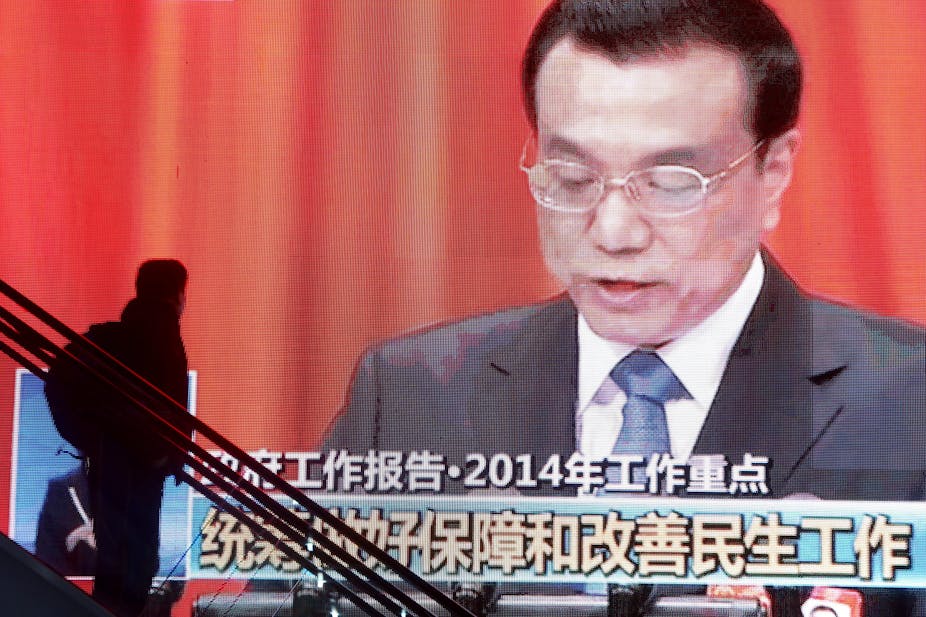China’s Premier, Li Keqiang, presented his annual Work Report to the National People’s Congress on Wednesday, and the media dutifully reported the big ticket items: a 7.5% GDP growth target for 2014 and an acceleration of free trade negotiations with Australia.
But Li Keqiang’s extensive report had a number of more nuanced key messages aimed at several clear audiences.
The report provides reassurances for an international audience wary of a slowdown in growth. It highlights the government’s commitment to pollution and corruption reduction for domestic consumers.
The most interesting messages are reserved for China’s political and business elite.
The report is a blueprint for an ambitious and comprehensive reform agenda that could impact huge swathes of the economy from breaking up government monopolies to corporatising financial services.
If implemented, it would be a big step towards giving China a better market economy and a more transparent system of governance.
Beijing calling
Li Keqiang’s message to his international audience is that China will maintain sustainable economic growth and a stable society.
Li explicitly acknowledged concerns in the West that China’s economy may be in for a “hard landing”. In response, he committed the government to deficit reduction, spending cuts and allowing the renminbi to fluctuate in a wider band.
Foreign trade is planned to increase by 7.5%, conditions for foreign investors will be improved and approval procedures for outbound investment streamlined.

For the audience at home, Li Keqiang’s message was about the competence of the government.
the Work Report reads in places like the election platform of a political party aiming to show that it is in full control of a huge reform agenda and that people can trust the government’s ability to solve problems as diverse as poverty, pollution, inequality and official corruption.
A Chinese Reagan?
But speaking to China’s business and politician class, Li Keqiang produced an elaborate blueprint for wideranging market and fiscal reforms that promise to be the foundation for a deregulated and liberalised economy.
The reform priorities – marketisation, entrepreneurship and public finance – were outlined by President Xi Jinping at a policy meeting, the Third Plenum, last November.
The Premier’s report converts these policy priorities into a deregulation agenda that includes abolition of government monopolies, opening state-controlled industries to private capital and the corporatisation of the banking sector.
Private entrepreneurship is recognised for its contribution to innovation and employment creation. The private sector is to benefit from better access to bank finance and protection of intellectual property rights. New markets in services and other areas will be open to foreign participants.
So far most of these reforms are on paper, although some are being trialled in local experiments as is normal procedure in China.
These deep structural reforms are to be accompanied by social welfare reforms – including granting millions of people the right to live and work in cities – aiming to reduce the gap between urban and rural living standards.

Li Keqiang’s reform agenda has the potential to make history. It is the most ambitious and comprehensive reform agenda formulated since economic reforms began in China 35 years ago.
The dilemmas these reforms are attempting to address have long been known, including how the banking monopoly prevents private enterprises from accessing bank credit or how the system of local public finance forces local governments into debt.
Xi Jinping put these problems on the agenda. Li Keqiang’s report draws up a policy framework.
For the first time, a comprehensive new government system is emerging that incorporates private entrepreneurship and a market-based fiscal system.
In international historical perspective, this agenda is comparable to the deregulation Australia undertook during the Hawke and Keating years.
Li Keqiang‘s report does not directly address headline issues like shadow banking and local government debt because these are subsumed under broader reform agendas. And the report doesn’t mention a timeline for implementation.
While the reform agenda is conceptually radical, implementation will be conservative as changes are phased in slowly following local trials. It’s unlikely major changes will be in place in just one year.
A more likely scenario is that Li Keqiang is beginning the groundwork for the next Five Year Plan, from 2016 to 2020. But even if the wait is till then, this is the best indication yet that the Chinese government wants a better market economy and a better system of governance.

